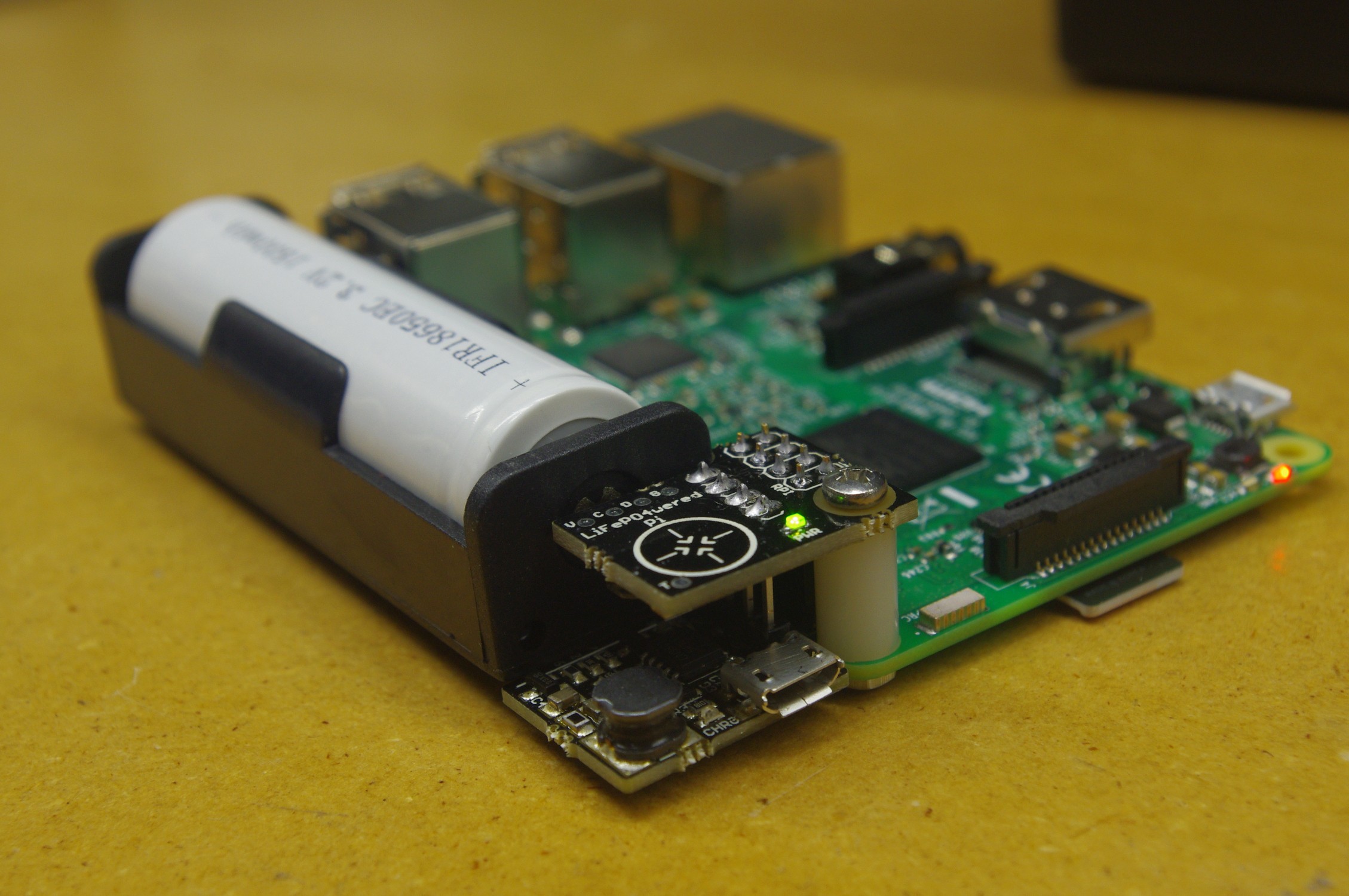Kind of late I know, people following me on Twitter or looking on Tindie already knew. I had forgotten that I hadn't mentioned it here yet, sorry. :)
So you can now buy a close-to-perfect power manager for the Raspberry Pi on Tindie! I wouldn't have dared to make such a claim about the LiFePO4wered/Pi, there were too many people who wanted to use it with the Pi 3 and who wanted input voltage monitoring and the behavior associated with that. But now that both these cases are supported with the LiFePO4wered/Pi3, we're getting there! :)
A couple of things are still missing:
- Adding RTC functionality would be great.
- Some people don't need a big battery for long run times. They just want a small battery to shut down safely, but be able to run indefinitely at high load when plugged in. While the LiFePO4wered/Pi3 can be used for this, its battery is overkill. So... I have some ideas. :)
If you like this and want to support my continuing development, please had over to Tindie and buy one!
 Patrick Van Oosterwijck
Patrick Van Oosterwijck
Discussions
Become a Hackaday.io Member
Create an account to leave a comment. Already have an account? Log In.
I wondered if I could use this in conjunction with an external USB power bank to extend the battery. I have an Anker PowerBank 79-S4552 4500mAh bank that provides 5V 1A power. I connected this to the LiFePO4wered/Pi3 power port and ran the same test to run down the batteries to see how long it took the Pi to run out of power. The answer is 1198 minutes or 19.9 hours! That's well beyond what I need for my purposes, so for me it appears the answer will be to combine the LiFePO4wered/Pi3 with a small external power bank. Hope this feedback has been helpful.
Are you sure? yes | no
Tried with a Raspberry Pi Zero to see how that would react. Using the same SD card and similar tweaks to the second run (no HDMI, no LEDS) and with a Panda PAU05 USB wireless adapter connected to my network, I saw 204 minutes of runtime. That was a bit surprising as I would have expected the Pi Zero to last a fair bit longer than the 3.
Are you sure? yes | no
That's odd, I would expect the Pi Zero to last longer as well. Of course the wild card here is the power consumption of the WiFi adapter. The Pi 3's built-in WiFi can be quite efficient as it is powered from the Pi's own power system, while a USB WiFi dongle does its own separate conversion from the USB 5V down to (likely) 1.8V. This conversion is often not very efficient in small dongles.
I tried to replicate your test with an Edimax EW-7811Un (I think), I didn't bother to turn off HDMI or LEDs and I got a run time of 370 minutes (6 hours 10 minutes). Not sure why your run time was so low.
Are you sure? yes | no
I would also expect a much longer runtime. My 2nd test with the Pi Zero came out to 199 minutes. That is using the same Panda wifi dongle as the first time, and I'm now wondering if that adapter is part of the slowdown. I also have a Trendnet TEW-648UBM dongle and I'm going to retry with that one to see if it makes a difference.
Are you sure? yes | no
OK, so my 3rd run with the Pi Zero - this time using the Trendnet TEW-648UBM wifi dongle instead of the Panda resulted in 401 minutes of runtime. Nothing else changed with my setup.
What that's telling me is wow pay special attention to the wifi adapter you use, in this case it doubled the runtime.
Are you sure? yes | no
Thanks for the update Robert! Glad to see you got run times in the range you were looking for.
Would be nice if someone had a list of very low power USB peripherals for the Pi.
Are you sure? yes | no
I disconnected and disabled the physical ethernet adapter and connected to my network via wifi. This resulted in a significant improvement - 310 minutes of runtime. That's the only change from the last try.
Are you sure? yes | no
My second run included more tweaking - disabling HDMI, bluetooth, the onboard soundcard, all of the LEDs that I could identify, and the powered USB ports. I also killed a number of daemons that were not needed.
The total for that runtime was 208 minutes - almost identical to the first one. It's very good for a single battery tied to a pi3, but for my purposes I'd like it to last 6 hours (enough for a cross-country flight). In the next few days I'll retry this with a Pi Zero+wifi adapter to see if that will last longer. I suspect it will, but perhaps not all the way to the 6 hour mark I'm looking for.
Are you sure? yes | no
I just tested mine with an Rpi3, standard Raspbian install. I disabled HDMI and the power LED and was using a wired ethernet connection. No USB connections or anything else.
On battery power only (and starting from a running system where I pulled the power connection) I saw 209 minutes of runtime, or 3.4 hours.
Are you sure? yes | no